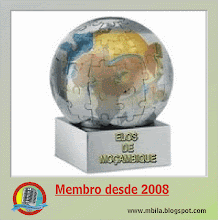Over the past years the 38 years albino from northern Mozambique won immense popularity in his home country where he is known as the "local Salif Keita".
He released four solo albums so far and performed as support act in the line-up of Keita's first concert in Maputo.
In June 2006 Ali Faque started his international career as special guest of Eyuphuro's comeback-tour in Europe. In distinguished company of great singers Zena Bacar and Issufo Manuel he proved that he is one of the remarkable voices to emerge from Mozambique.
“Vidisco had exploit me a lot and I am still poor”
Ali Faque reports his course, dreams and ambitions, criticizing clearly the cultural mosaic of Mozambique,considering it alienated. In his point of view, the local record companies are the promoters of piracy, but playing the game of self-victimization.
Most of the local businessmen are uncultivated and more anxious to finance TV-soaps from Brazil.
Albino and endowed with talent, like Salif Keita from Mali, the Mozambican Ali Faque suffered
stigmatization in his society, but his musical talent redeemed him to national recognition. An obviously connexion between both musicians.
Why your approach to Salif Keita?
I admire him, I like his music and I be impressed by his story. His story can be compared with my own past. We got discriminated as albinos, we got rejected by members of our families.
Where Ali Faque was born?
I was born in Angoche, in the quarter Inguri. My mother told me, that I got rejected by my father after my birth. My uncle took me out of our house to hide me at the beach. Who found me there was a man called Ussene, who lived near the beach. They told me that my uncle had left me on a place where the local people used to defecate. My uncle thought I would to die of hunger.
Being albino you are still feel discriminated today?
Yes, in some situations. But it doesn’t hurt so much like in the past. I am a man now, living in my own house and I learned to ignore the people who despise me.
In one of your songs you make a dedication to Salif Keita...
Yes, in a way to ask him for help. In the song I also intend to appeal to the union of Africans. I want ask Salif Keita for support. But I don’t have the conditions to establish a contact.
Which kind of support?
I would like to have a recording studio, some sound equipment and transport, so that I could perform for the people in different places. A musician without his own sound equipment can’t attain his aim. If you don’t have money you are limited to imagination.
Most musicians in this country don’t have this conditions and there are no serious concert
promoters. In other countries businessmen promoting their own culture, but not here in Mozambique.
Albino and endowed with talent, like Salif Keita from Mali, the Mozambican Ali Faque suffered
stigmatization in his society, but his musical talent redeemed him to national recognition. An obviously connexion between both musicians.
Why your approach to Salif Keita?
I admire him, I like his music and I be impressed by his story. His story can be compared with my own past. We got discriminated as albinos, we got rejected by members of our families.
Where Ali Faque was born?
I was born in Angoche, in the quarter Inguri. My mother told me, that I got rejected by my father after my birth. My uncle took me out of our house to hide me at the beach. Who found me there was a man called Ussene, who lived near the beach. They told me that my uncle had left me on a place where the local people used to defecate. My uncle thought I would to die of hunger.
Being albino you are still feel discriminated today?
Yes, in some situations. But it doesn’t hurt so much like in the past. I am a man now, living in my own house and I learned to ignore the people who despise me.
In one of your songs you make a dedication to Salif Keita...
Yes, in a way to ask him for help. In the song I also intend to appeal to the union of Africans. I want ask Salif Keita for support. But I don’t have the conditions to establish a contact.
Which kind of support?
I would like to have a recording studio, some sound equipment and transport, so that I could perform for the people in different places. A musician without his own sound equipment can’t attain his aim. If you don’t have money you are limited to imagination.
Most musicians in this country don’t have this conditions and there are no serious concert
promoters. In other countries businessmen promoting their own culture, but not here in Mozambique.
Musicians are also victims of injustice by local record companies. The laws of the game are unclear. No record company in Mozambique remunerate the musicians with royalties. A musician should get at least 10 per cent for each unit sold by the record label because the music is his property. The record companies claim to be victims of piracy, but sometimes I think: why these record companies are always complaining to be victim of piracy when they are the masters of piracy. Sometimes I think it would be the best to pay for the recordings, copy the units on a computer and sell my music by myself.
The record labels are acting in complete inhumanity, they are doing it officially by day and don’t want to know about the situation of the musician.
Why you need to ask Salif Keita for help, don’t you get no support in Mozambique?
I never got any support, only from the former Minister for Environment, Bernardo Pedro Ferraz. We have serious problems in the cultural arena. Local businessmen achieve to sponsor TV-soaps from Brazil, they are slumbering people with no imagination to increase the value of our own culture.
If someone visit Mozambique and tune in to a national TV-station, he could think he is in Brazil.
They downgrade our authentic culture. Who can explain this?
Are you attacking the local record companies?
I would like to find a serious record label, I will look for a lawyer to get out of Vidisco. They explored me so much and I am still poor. Enough of this!
You find fault with everything...
The State depreciate the culture. The musicians are serviceable for political campaigns. The national TV station wasted 50 thousand US-Dollar for a show with Patricia Faria. What a shame! I can’t understand that the civilized is the person who despised himself. The civilized accept to be poor ... but our TV is not civilized. Why they didn’t called all musicians from the country and paid 200 US Dollar each? They left the local musicians on the street to be hungry. The
musicians are crucified. Also for an artist to participate at Aids campaigns that organizations pay
pittance. This is a moral insult.
Why you need to ask Salif Keita for help, don’t you get no support in Mozambique?
I never got any support, only from the former Minister for Environment, Bernardo Pedro Ferraz. We have serious problems in the cultural arena. Local businessmen achieve to sponsor TV-soaps from Brazil, they are slumbering people with no imagination to increase the value of our own culture.
If someone visit Mozambique and tune in to a national TV-station, he could think he is in Brazil.
They downgrade our authentic culture. Who can explain this?
Are you attacking the local record companies?
I would like to find a serious record label, I will look for a lawyer to get out of Vidisco. They explored me so much and I am still poor. Enough of this!
You find fault with everything...
The State depreciate the culture. The musicians are serviceable for political campaigns. The national TV station wasted 50 thousand US-Dollar for a show with Patricia Faria. What a shame! I can’t understand that the civilized is the person who despised himself. The civilized accept to be poor ... but our TV is not civilized. Why they didn’t called all musicians from the country and paid 200 US Dollar each? They left the local musicians on the street to be hungry. The
musicians are crucified. Also for an artist to participate at Aids campaigns that organizations pay
pittance. This is a moral insult.
What you got out from your music?
I got local fame and prolong poor... I am in the row of poverty.
I got local fame and prolong poor... I am in the row of poverty.
By: Rafael Bie














Sem comentários:
Enviar um comentário